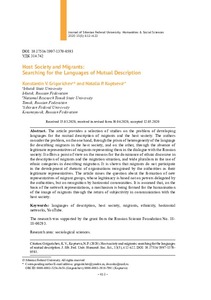Показать сокращенную информацию
Host Society and Migrants: Searching for the Languages of Mutual Description
| Автор | Grigorichev, Konstantin V. | en |
| Автор | Koptseva, Natalia P. | en |
| Автор | Григоричев, К.В. | ru_RU |
| Автор | Копцева, Н.П. | ru_RU |
| Дата внесения | 2020-05-31T01:16:21Z | |
| Дата, когда ресурс стал доступен | 2020-05-31T01:16:21Z | |
| Дата публикации | 2020-05 | |
| URI (для ссылок/цитирований) | https://elib.sfu-kras.ru/handle/2311/135293 | |
| Аннотация | The article provides a selection of studies on the problem of developing languages for the mutual description of migrants and the host society. The authors consider the problem, on the one hand, through the prism of heterogeneity of the language for describing migrants in the host society, and on the other, through the absence of legitimate representatives of migrants representing them in the dialogue with the Russian society. It offers a point of view on the reasons for the dominance of ethnic discourse in the description of migrants and the migration situation, and wide pluralism in the use of ethnic categories in describing migration. It is shown that migrants do not participate in the development of rhetoric of organisations recognised by the authorities as their legitimate representatives. The article raises the question about the formation of new representatives of migrant groups, whose legitimacy is based not on powers delegated by the authorities, but on recognition by horizontal communities. It is assumed that, on the basis of the network representations, a mechanism is being formed for the humanisation of the image of migrants through the return of subjectivity in communication with the host society | en |
| Аннотация | Статья открывает подборку исследований, посвященных проблеме выработки языков взаимного описания мигрантов и принимающего общества. Авторы рассматривают поставленную проблему, с одной стороны, через призму неоднородности языка описания мигрантов в принимающем обществе, а с другой – через отсутствие легитимных представителей мигрантов, представляющих их в диалоге с российским обществом. Предлагается взгляд на причины доминирования этнического дискурса в описании мигрантов и миграционной ситуации, и широкого плюрализма в использовании этнических категорий при описании миграции. Показывается, что мигранты не принимают участия в выработке риторики организаций, признаваемых властью в качестве их легитимных представителей. Ставится вопрос о формировании новых представителей мигрантских групп, чья легитимность опирается не на полномочия, делегированные властью, а на признание горизонтальными сообществами. Предполагается, что на основе сетевых репрезентаций происходит формирование механизма гуманизации образа мигрантов через возвращение им субъектности в коммуникации с принимающим обществом | ru_RU |
| Язык | en | en |
| Издатель | Сибирский федеральный университет. Siberian Federal University | en |
| Тема | languages of description | en |
| Тема | host society | en |
| Тема | migrants | en |
| Тема | ethnicity | en |
| Тема | horizontal networks | en |
| Тема | YouTube | en |
| Тема | языки описания | ru_RU |
| Тема | принимающее общество | ru_RU |
| Тема | мигранты | ru_RU |
| Тема | этничность | ru_RU |
| Тема | горизонтальные сети | ru_RU |
| Тема | YouTube | ru_RU |
| Название | Host Society and Migrants: Searching for the Languages of Mutual Description | en |
| Альтернативное название | Принимающее общество и мигранты: в поисках языков взаимных описаний | ru_RU |
| Тип | Journal Article | en |
| Контакты автора | Grigorichev, Konstantin V.: Irkutsk State University Irkutsk, Russian Federation; National Research Tomsk State University Tomsk, Russian Federation; grigoritchev@yandex.ru; ORCID: 0000-0002-5256-5658 | en |
| Контакты автора | Koptseva, Natalia P.: Siberian Federal University Krasnoyarsk, Russian Federation; decanka@mail.ru; ORCID: 0000-0003-3910-7991 | en |
| Контакты автора | Григоричев, К.В.: Иркутский государственный университет Российская Федерация, Иркутск; Национальный исследовательский Томский государственный университет Российская Федерация, Томск | ru_RU |
| Контакты автора | Копцева, Н.П.: Сибирский федеральный университет Российская Федерация, Красноярск | ru_RU |
| Страницы | 612–622 | ru_RU |
| DOI | 10.17516/1997-1370-0593 | |
| Журнал | Журнал Сибирского федерального университета. Гуманитарные науки. Journal of Siberian Federal University. Humanities & Social Sciences;2020 13 (5) | en |

